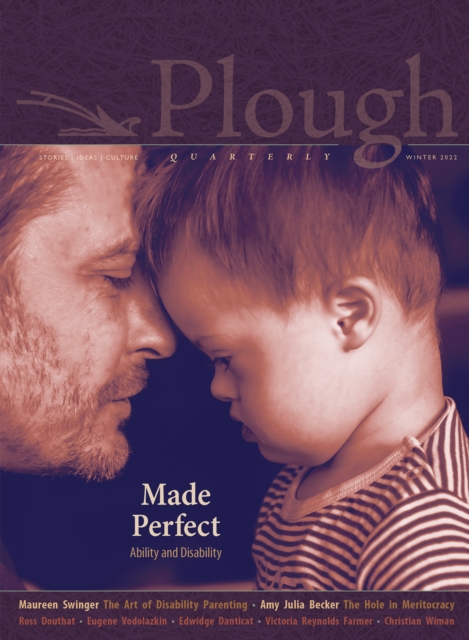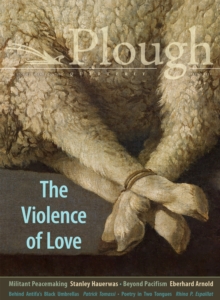
Plough Quarterly No. 30 - Made Perfect : Ability and Disability Paperback / softback
by Molly McCully Brown, Victoria Reynolds Farmer, Edwidge Danticat, Stephanie Saldana, Kelsey Osgood, Christian Wiman, Amy Julia Becker, Ross Douthat, Eugene Vodolazkin, Sarah C. Williams
Part of the Plough Quarterly series
Paperback / softback
Description
Whose lives count as fully human? The answer matters for everyone, disabled or not. The ancient Greek ideal linked physical wholeness to moral wholeness - the virtuous citizen was "beautiful and good." It's an ideal that has all too often turned deadly, casting those who do not measure up as less than human.
In the pre-Christian era, infants with disabilities were left on the rocks; in modern times, they have been targeted by eugenics. Much has changed, thanks to the tenacious advocacy of the disability rights movement.
Yesteryear's hellish institutions have given way to customized educational programs and assisted living centers.
Public spaces have been reconfigured to improve access.
Therapies and medical technology have advanced rapidly in sophistication and effectiveness.
Protections for people with disabilities have been enshrined in many countries' antidiscrimination laws. But these victories, impressive as they are, mask other realities that collide awkwardly with society's avowals of equality.
Why are parents choosing to abort a baby likely to have a disability?
Why does Belgian law allow for euthanasia in cases of disability, even absent a terminal diagnosis or physical pain?
Why, when ventilators were in short supply during the first Covid wave, did some states list disability as a reason to deny care?On this theme: - Heonju Lee tells how his son with Down syndrome saved another child's life. - Molly McCully Brown and Victoria Reynolds Farmer recount their personal experiences with disability. - Amy Julia Becker says meritocracies fail because they value the wrong things. - Maureen Swinger asks six mothers around the world about raising a child with disabilities. - Joe Keiderling documents the unfinished struggle for disability rights. - Isaac T. Soon wonders if Saint Paul's "thorn in the flesh" was a disability. - Leah Libresco Sargeant reviews What Can a Body Do? and Making Disability Modern. - Sarah C. Williams says testing for fetal abnormalities is not a neutral practice. Also in the issue: - Ross Douthat is brought low by intractable Lyme disease. - Edwidge Danticat flees an active shooter in a packed mall. - Eugene Vodolazkin finds comic relief at funerals, including his own father's. - Kelsey Osgood discovers that being an Orthodox Jew is strange, even in Brooklyn. - Christian Wiman pens three new poems. - Susannah Black profiles Flannery O'Conner. - Our writers review Eyal Press's Dirty Work, Steve Coll's Directorate S, and Millennial Nuns by the Daughters of Saint Paul. Plough Quarterly features stories, ideas, and culture for people eager to apply their faith to the challenges we face.
Each issue includes in-depth articles, interviews, poetry, book reviews, and art.
Information
-
Available to Order - This title is available to order, with delivery expected within 2 weeks
- Format:Paperback / softback
- Pages:112 pages, Illustrations, unspecified
- Publisher:Plough Publishing House
- Publication Date:14/12/2021
- Category:
- ISBN:9781636080499
Information
-
Available to Order - This title is available to order, with delivery expected within 2 weeks
- Format:Paperback / softback
- Pages:112 pages, Illustrations, unspecified
- Publisher:Plough Publishing House
- Publication Date:14/12/2021
- Category:
- ISBN:9781636080499










